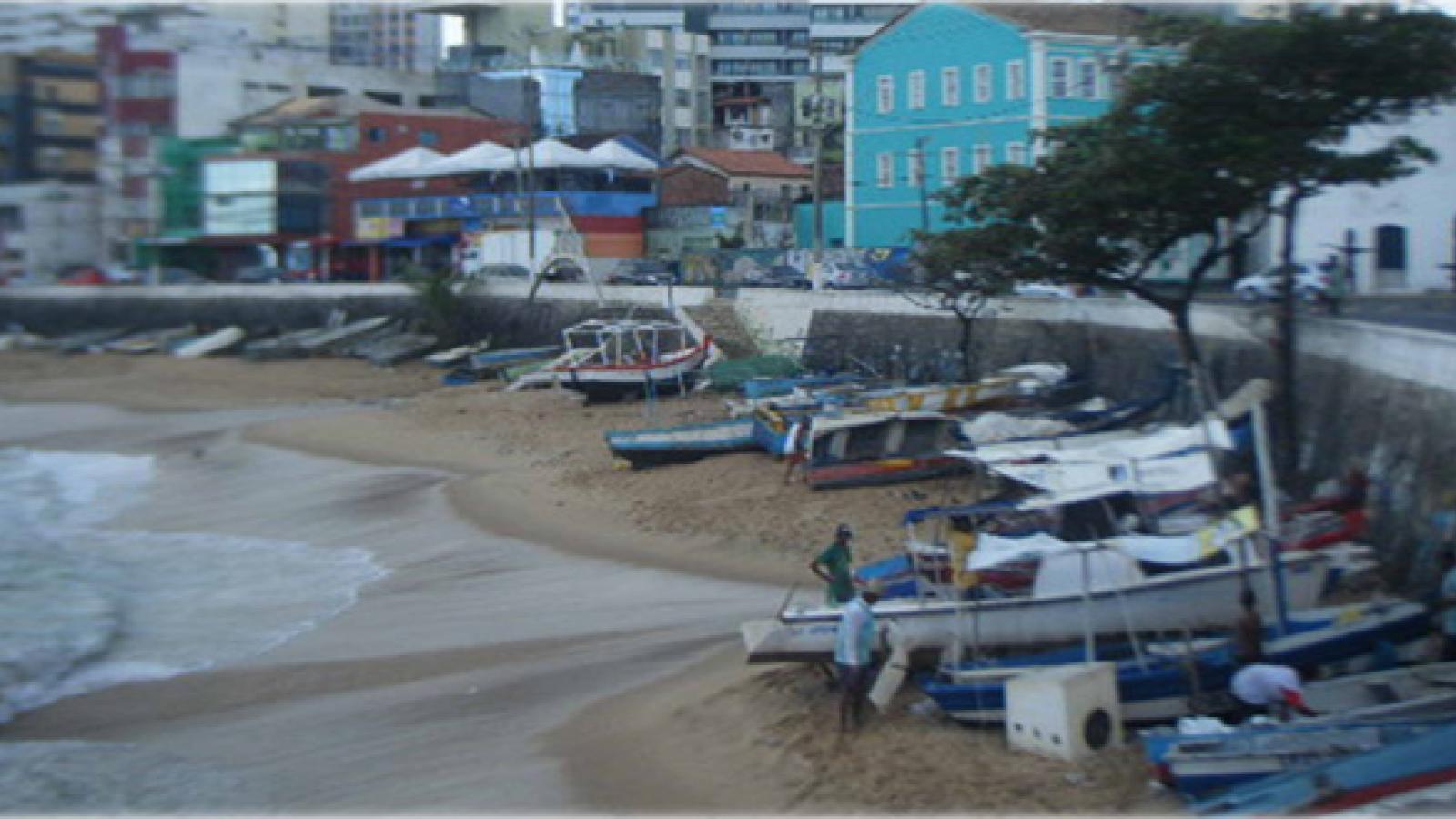Global Gateway Trip: Brazil
Sarah Pfledderer
Sarah Pfledderer is a senior. She is majoring in Journalism, and also completing a minor in International Studies. She, along with a group of other OSU students, participated in the Global Gateway trip to Brazil. Here is her story.
"Eucalyptus trees were introduced to Brazil upon the arrival of the Portuguese at the brink of the 19th century. Now their sky-bounding canopies and lengthy lean trunks are all around the country. Settled within a controlled, yet miniscule portion of eucalyptus at a forest reserve in Rio Claro, Brazil there sprouts a more familiar tree species: the palm tree.
It was at this reserve I found a genuine fondness for Brazilian culture when, with my peers in the Brazil Global Gateway Program, we found ourselves captivated by the sight of jubilant children being pulled down a gently slanted hill by their parents on fallen palm tree leaves. We found ourselves amidst a range of other visitors and native onlookers who chose the mere enjoyment of the sound of a child's amusement from riding on a leaf rather than relying on any technologies for their entertainment. This moment was matchless to any other experiences I've had at Ohio State, being I am used to a campus flooded with students plugged into their iPods between classes, texting under the desk in lectures and flipping open Mac books at the library. Seeing a leaf suffice for entertainment instilled in me it's acceptable to live a simple and "selfless" life, as Tiara Washington, third-year in respiratory therapy referred to Brazilian culture.
Tiara said she saw much selfless behavior during our time in Araraquara and Salvador due to the lack of technology in Brazil. "Technology in the United States allows us only to be concerned with ourselves, never even considering the fact that someone else may need our help," she said at a barbeque one of our newfound Brazilian friends held in honor of our visit. The hostess didn't even eat to ensure there was enough food for us. Tiara added, since her return to the U.S. she is feels inspired to give more to others as well.
On our first leg of the program in Araraquara at our host university, UNESP, I also observed such selflessness. I was impressed with how unwired students were and admired the impact it had their culture and, at the end of the journey, that it had on me.
UNESP students were flabbergasted by the sight of the Macs our group brought to campus, and in time we noticed how little students used their cell phones in public. By the end of our stay, I for one had not seen even a glimpse of an iPod on the university's grounds.
English majors were most hospitable given that they were delighted to put their studies to use in conversation with our group, and we in turn were desperate to learn some survival Portuguese from them since there was no language requirement to apply to the Global Gateway. Thus I applied to the program having knowledge only of German as a second-language, a language far from Portuguese. The majority of the 17 students in our group had studied Spanish, however, and said having the background made it easier to pick up Portuguese. "I had the misconception in the beginning that knowing Spanish meant I would instantly be able to understand Portuguese, and I found out pretty quick that was false!" said Ariana Belle, second-year in international studies in Development and one of the strongest Spanish speakers in our group.
Ariana added after about two weeks she felt she could easily understand most Portuguese and was able to comfortably carry on a conversation, but found people viewed her as a Spanish speaker when she used her Portuguese because of a significant difference in accents.
In conjunction with sharing our languages, UNESP students dutifully encouraged us to join them at social outings outside of class where we shared the norms of our cultures. I found amusement in a few of the following differences: Brazilians greet one another with a customary cheek kiss, which is actually a graze of the cheek and kiss to the air. Toilet paper doesn't go in the toilet; it goes in the trashcan. Milk is served and sold warm. Coffee is served in miniature cups, unless paired with milk. It's not expected to receive a diamond when getting engaged. I also received some alarming feedback from a UNESP student who admitted most Brazilians hate the way North Americans text so vigorously, because it's outwardly rude and unfriendly. Perhaps this is why we found the students to be so kind and welcoming toward us since they were enticed by our presence, not ours or their gadgets.
Along with this altruistic means of life in the state of Sao Paulo, we found Salvador had similar offerings as we embarked on our second leg of the trip through its touristy town on the Atlantic coast. We had home stays, where I found another amusement in seeing monkeys, instead of birds, perching on phone lines. Salvador overflowed with history and African influence, being it was the first town colonized by the Portuguese and dubbed Brazil's first capital. It was Brazil's center as one of the last countries to abolish slavery.
What seemed like limitless amounts of multihued favelas (slums) rose up on the outskirts of the city in dense quarters. Kathleen Hamel, third-year in International Studies in Development, said she took notice of this. There is a large gap between the rich and poor, regardless of Brazil having the fifth largest economy in the world. This point was heavily stressed to us in several lectures at UNESP and at our Salvador host institute, ACBEU. Kathleen added, "In my opinion, Brazil needs to strongly focus on its social development, which is made evident through its corrupt education system."
To an extent, I envy Brazil's education system at the college level. I was puzzled to learn from UNESP students they attend the public university for free with government funding and are given a higher quality education than private universities which are not free. The circumstances are switched in high school though, where public schools are free to attend and private schools require fees. However, public schools do not offer a quality education, especially for college preparation. This leaves a majority of high school graduates to independently study for years after graduation to test in to public universities. The corruption lies in society's acceptance of this without taking strides toward correcting the problem that public high schools and private universities are below par.
Destiny Jackson, a fourth-year in Film Studies and Sociology said she felt Brazilians lacked concern for government and social issues. She mentioned when asking "what was being done to reduce the numbers of people who are homeless, especially by the Catholic Church, I could never seem to get a straight answer." Instances such as this stood out to the majority of our group.
"I wrongly assumed that other countries were doing lots more volunteer work and paid more attention to social issues, but by being taken out of the U.S. and being put in another country I was definitely able to see the U.S. does not deserve the bad and selfish reputation it continually gets." Upon returning to the U.S. Destiny sees our country "with new eyes." She has noticed more people, prominently OSU students, behaving selflessly in their volunteer efforts.
Nevertheless, while in Salvador we did see some attempts to address social and economic issues on a field trip to a housing development built by prospective and underprivileged community members with governmental funding. We saw similar efforts on a field trip to Baguncaco, a non-profit music school for children to attend before or after school to prevent them from roaming the community's drug-ridden streets.
Michael Jaskot, a now-graduated senior from our group in International Studies in International Relations and Diplomacy said upon his return to the U.S. he couldn't shy away from the influence the Global Gateway Program and Brazilians had on him. "This propelled me to utilize my 'gift' (speaking English) and help those that need it the most," Michael said as he has landed a job teaching English back in Araraquara and is scheduled to depart in January.
Unfortunately, I won't be able to travel back to Brazil anytime soon, but I have high hopes to return within the next ten years to visit my host mom, Leda from Salvador, after I learn more Portuguese.
Katey Borland, Professor of Comparative Studies at OSU and resident director of the Brazil Global Gateway said preparations are in gear for next year's program so students may hopefully be enrolled in a web-based Portuguese language study just as soon as they are admitted to the program. It will be under the new direction of Lúcia Costigan, Professor of Spanish and Portuguese at OSU. Professor Borland said enrollment in the web-based study should "frontload some of the important information and skills students need to make the most of the experience." Furthermore, students will be attending a different UNESP campus and are scheduled to go on more field trips in Salvador rather than attend lectures.
Professor Borland recalled a day trip to Cachoeira from our base in Salvador being one of her fondest memories from the program. She enjoyed the feel and architecture of the town, the trip to the Hans Bahia house, sleeping in the monastery and eating at the farm.
Other memorable moments she said were going to a samba club in Sau Paulo, attending a folk ballet in Salvador and getting UNESP students to sing Carmen Ohio with us. Singing Carmen was also one of my fondest memories of the trip along with withdrawing from an ATM my first handful of colorful Reais, the Brazilian currency. I greatly enjoyed the Baguncaco students teaching us how to drum on their recycled instruments. More memories include being introduced to the song "Zum Zum Baba" and our group chanting the tune through our remaining weeks, seeing my host mom fascinated with us readying for our day using makeup and without a doubt the image of children riding on a palm tree leaf. These have become not only my most fond memories of the Brazil Global Gateway trip, but they have become some of my fondest memories of my tenure at OSU."


